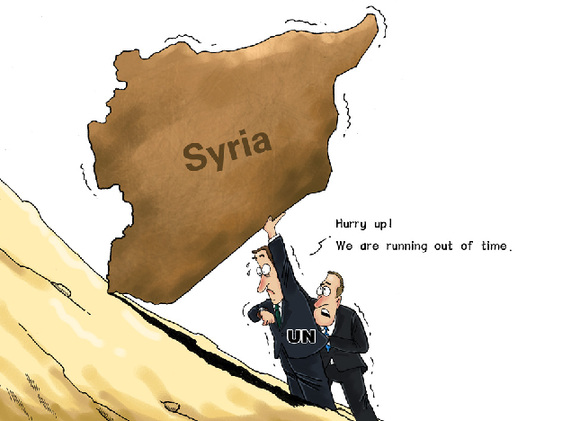Geneva IV and ray of hope for Syrian peace
- By Sajjad Malik
 0 Comment(s)
0 Comment(s) Print
Print E-mail China.org.cn, March 9, 2017
E-mail China.org.cn, March 9, 2017
|
|
|
Time is running out [By Zhai Haijun / China.org.cn] |
The warring sides in the bloody Syrian conflict ended talks in Geneva with a commitment to meet again for further negotiations. The development has been hailed as a success by many, including U.N. mediator Staffan de Mistura.
The U.N. envoy announced last Friday that the various parties had agreed on a finalized agenda for another round of negotiations, or "Geneva V," later in March.
The outcome strengthens the belief that parties to the conflict realize negotiations are the only way to end the raging war which, in six years of the fierce fighting, has killed about a half a million people, injured more than a million and displaced a total of about 12 million people, many fleeing to become refugees elsewhere.
The parties also accepted that U.N. resolution 2254, adopted by the Security Council in 2015, will serve as the main plank for any further negotiations. The resolution provides the basis for a political transition focusing on three subjects, including accountable governance, a new constitution and U.N.-supervised elections.
Agreement on a political transition is the main demand of the opposition groups while the government side insists on first tackling terrorism. To achieve a compromise, terrorism has been added as a fourth "basket" of issues to be addressed alongside the three subjects identified in the UN resolution.
It was a difficult compromise as the opposition suspected the government of using terrorism to delay the peace process. However, terrorism is a hot topic that certainly cannot be left for any incoming government to tackle. It is better to sort it out at this stage than face unhappy consequences in the future, as happened in Iraq.
Geneva IV occurred in a difficult environment due to a faltering ceasefire and fresh militant attacks. At the start of the week-long talks, De Mistura had admitted he wasn't hopeful of a major breakthrough. Now, however, there is a ray of hope to end the violence in Syria.
The situation has changed since June 2012 when the United States, Russia and other nations gathered in the Swiss city, called later as Geneva I, and came up with a statement demanding formation of a transitional governing body. Geneva II in February 2014 and Geneva III in February 2016 were arranged at the height of fighting, with no clear victor in sight.
However, the opposition had become weaker in recent months and also lost some important territories. The government side is more confident and amenable to seeking common ground to end the bloodshed. Since the momentum now lies with Damascus, it is the most suitable time to seek political settlement with the rebels who are not in a position to dictate terms.
The sticking point will certainly be the role of President Bashar al-Assad in the transitional period and his final fate. It would be almost impossible for the opposition groups and their backers to accept him as overlord after the years of bloodshed. They would have to agree on a formula for an honorable exit for the Syrian strongman, assuming he's willing to go.
The issue of terrorism is no less crucial than the fate of Assad. Having a political settlement without removing the causes of violence, and the groups and individuals perpetrating it, would result in another period of senseless violence.
Parallel to the Geneva process, the Kazakhstan capital of Astana will serve as a venue for a separate track of talks where, already in January, an important meeting was held to take care of ceasefire and other security matters. The second meeting will be held in Astana on March 14, under the guidance of Russia. Terrorism will also be dealt with in Astana to let the Geneva parties concentrate on political matters.
Apart from Russian, another two key players of the conflict - Turkey and Iran - are involved in the Astana process and are backing the security measures being established.
The consolidation of the ceasefire and agreement on confidence-building measures like exchange of prisoners and opening corridors for humanitarian access would be crucial to maintain the momentum for progress on the political issues.
Sajjad Malik is a columnist with China.org.cn. For more information please visit:
http://www.china.org.cn/opinion/SajjadMalik.htm
Opinion articles reflect the views of their authors, not necessarily those of China.org.cn.







Go to Forum >>0 Comment(s)